Ubya
International Hazard
    
Posts: 1247
Registered: 23-11-2017
Location: Rome-Italy
Member Is Offline
Mood: I'm a maddo scientisto!!!
|
|
DIY Heating Mantle (How To Build It)
How to Build a Heating Mantle
Materials:
Heating Mantle Sleeve (i bought this one)
Metal pot with lid
Glass wool
Power cord
2 wire connectors
Heat shrink tubing
Total cost for the matierials 15€
First of all you must choose the Heating element, you could try building one yourself but it's hard and improper building can lead to short circuits
or bare wires touching the housing. I chose to buy on ebay a 250W heating element already woven with fiberglass that fits a 500ml RBF.
Once we chose the heating element we need a container, it should be metal, (wood and plastics are not really compatible with high heat) and be big
enough to fit the heating element and some insulation. I bought a cheap aluminium pot with a diameter of 20cm and a height of 10cm, you could use an
empty paint can or a big tin can. My heating element is 12cm wide and 7cm tall so i can fit 3cm of insulation on the bottom and 4cm on the sides, your
countainer should be big enough to fit at least some insulation on the bottom and on the sides, more insulation is better, just don't go overkill.
As insulation i chose glass wool because is cheap and easy to find, i bough a panel 1mx50cm for just 2€ at an hardware store, i cut a strip
10cmx50cm for the sides and a 10cm disc for the bottom, cut what you need depending on the housing you chose.
Next we need to choose how we are going to connect the heating element to a power cord, i first thought of using a socket with a detachable power cord
but i ended up connecting them directly. Soldering nichorme wire to a copper wire is not easy, the easiest way is to just crimp them toghether, i
twisted the nichrome wire around the copper core tightly and then secured it with a wire connector screwed tight but not so tight to break the wire,
heat shrink tubing is used to cover the live wires.
Needless to say the heating element is going to get hot, really hot, so it would be wise to use heat resistant wire insulation, but i didn't have any
so i improvised putting the wires close to the edge of the container with lots of insulation between them and the heating element.
Now we cut a hole in the lid as wide as the element and place everything together. The lid can be secured with screws, mine had a lip that i bent in a
way that could be crimped around the pot once put on top of it.
The heating element should not be loose in the container once closed, if it is add more insulation.
And it's done, just 30 minutes of building time and 1 month of waiting for the element to arrive from china
Remember to never plug the heating mantle directly into a wall socket, always use a variac or a dimmer.
---------------------------------------------------------------------
feel free to correct my grammar, or any mistakes i make
---------------------------------------------------------------------
|
|
|
XeonTheMGPony
International Hazard
    
Posts: 1640
Registered: 5-1-2016
Member Is Offline
Mood: No Mood
|
|
I used a can, and you need to support the mantle with the lid.
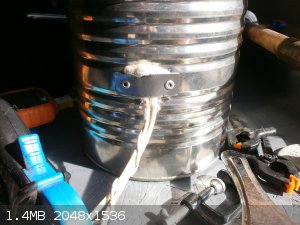 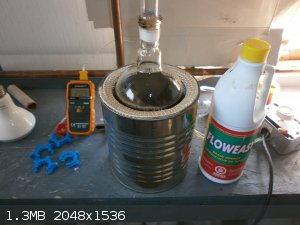 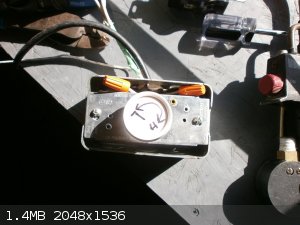
All so may I recommend mineral wool. Vs Fiber glass
Ask your local lumber yard for scrap pieces as you can often get them for free or near free
[Edited on 18-1-2019 by XeonTheMGPony]
|
|
|
Ubya
International Hazard
    
Posts: 1247
Registered: 23-11-2017
Location: Rome-Italy
Member Is Offline
Mood: I'm a maddo scientisto!!!
|
|
yes i know, right now the insulation is holding it tight to
the lid from below, i'll use some metal wire to "sew" it to to the lid
---------------------------------------------------------------------
feel free to correct my grammar, or any mistakes i make
---------------------------------------------------------------------
|
|
|
Sulaiman
International Hazard
    
Posts: 3695
Registered: 8-2-2015
Location: 3rd rock from the sun
Member Is Offline
|
|
The fibreglass wool looks similar to some that I tried for my diy mantle,
the yellowness is some chemical treatment that smokes when hot.
I think that the plastic insulation of your cable will melt
CAUTION : Hobby Chemist, not Professional or even Amateur
|
|
|
Ubya
International Hazard
    
Posts: 1247
Registered: 23-11-2017
Location: Rome-Italy
Member Is Offline
Mood: I'm a maddo scientisto!!!
|
|
Quote: Originally posted by Sulaiman  | The fibreglass wool looks similar to some that I tried for my diy mantle,
the yellowness is some chemical treatment that smokes when hot.
I think that the plastic insulation of your cable will melt
|
ah damn it, it smokes... if i heat it long enough can i remove all of the chemical? or maybe i should buy rockwool (but what if even it has this
binder?)
for the cable insulation, yea probably, i will try to test its limits, in the mean time i'm searching those high temperature insulating sleeves found
for example in soldering irons
---------------------------------------------------------------------
feel free to correct my grammar, or any mistakes i make
---------------------------------------------------------------------
|
|
|
wg48
National Hazard
   
Posts: 821
Registered: 21-11-2015
Member Is Offline
Mood: No Mood
|
|
Quote: Originally posted by Ubya  | Quote: Originally posted by Sulaiman  | The fibreglass wool looks similar to some that I tried for my diy mantle,
the yellowness is some chemical treatment that smokes when hot.
I think that the plastic insulation of your cable will melt
|
ah damn it, it smokes... if i heat it long enough can i remove all of the chemical? or maybe i should buy rockwool (but what if even it has this
binder?)
for the cable insulation, yea probably, i will try to test its limits, in the mean time i'm searching those high temperature insulating sleeves found
for example in soldering irons |
The danger is if the "binder" carbonizers it can short circuit your wiring or heating element or make the metal container live but hopfully you did
add an earth but from your pics it looks like you did not.
Yes the heat shrink insulation is very likely to overheat and carbonize as well. A common method to reduce the heating/temperature at the
connection to the heating wire is to fold the heating wire back on its self at least once and twist it together tightly. That reduces the temperature
rise because of its increased surface area and reduced resistance.
Its also common to place the connections in small ventilated box on the outside of the main housing to increases it cooling and reduce heat flow.
Unless the power lead is silicon insulated that has to be kept very cool (about <100C). You can purchase ceramics terminal blocks for the
connection. Brass and copper will significantly oxidise above 200C (or was it 300C) which will cause the connection to heat up even more and fail
even quicker. Special nickel wire is produced to make connection to the heating wire which is spot welded or crimped. Some low current terminal/cheap
terminal blocks have the clamps made from steel. Those will not oxidise at the temperatures that copper and brass do. Iron wire for garden purposes is
also available which I assume could also be use as a transition connection and much cheaper than nickel. The thicker type iron wire would be best.
Borosilicate glass:
Good temperature resistance and good thermal shock resistance but finite.
For normal, standard service typically 200-230°C, for short-term (minutes) service max 400°C
Maximum thermal shock resistance is 160°C
|
|
|
Ubya
International Hazard
    
Posts: 1247
Registered: 23-11-2017
Location: Rome-Italy
Member Is Offline
Mood: I'm a maddo scientisto!!!
|
|
i will test the conductivity of carbonized glass wool as a test.
wg48 nope i didn't add an earth connection because the circuit where my fumehood is connected to doesn't have one, not safe i know but that would
require a major upgrade to the electrical system. i will do the connections outside the container and will use fiberglass insulation on the inside
---------------------------------------------------------------------
feel free to correct my grammar, or any mistakes i make
---------------------------------------------------------------------
|
|
|
Sulaiman
International Hazard
    
Posts: 3695
Registered: 8-2-2015
Location: 3rd rock from the sun
Member Is Offline
|
|
My cake tin enclosure for my mantle is earthed and as WG48 mentioned, it is a good idea, but if not possible then a little extra care is required.
The smoke from the fibreglass binder is acrid and it stained my heating mantle yellow/brown - no harm, just ugly.
To insulate the heating wire tails I used this
https://www.ebay.co.uk/itm/Tube-High-Temperature-Fiber-Glass...
CAUTION : Hobby Chemist, not Professional or even Amateur
|
|
|
Ubya
International Hazard
    
Posts: 1247
Registered: 23-11-2017
Location: Rome-Italy
Member Is Offline
Mood: I'm a maddo scientisto!!!
|
|
exactly what i was planning to buy
---------------------------------------------------------------------
feel free to correct my grammar, or any mistakes i make
---------------------------------------------------------------------
|
|
|
wg48
National Hazard
   
Posts: 821
Registered: 21-11-2015
Member Is Offline
Mood: No Mood
|
|
Quote: Originally posted by Ubya  | i will test the conductivity of carbonized glass wool as a test.
wg48 nope i didn't add an earth connection because the circuit where my fumehood is connected to doesn't have one, not safe i know but that would
require a major upgrade to the electrical system. i will do the connections outside the container and will use fiberglass insulation on the inside
|
As heating elements are notorious for faults to the case. In addition if you unknowing spill something conducting into the mantel plus it is DIY job.
Perhaps you should consider installing RDC trip which does not require an earth connection though you would be safer with one that does. They cost
about £/$ 10 and you can probably get one that attaches to the power lead or you can in the UK. They are more expensive at about £20.
I found a 240V version for power lead for about £13 on ebay. You probably have something similar in your country.
https://www.ebay.co.uk/itm/J72G-C-POWERBREAKER-SAFETY-RCD-PL...
PS: You may not care but in America the electrical code may obligate the use of an RCD if water is involved with the appliance and to not do so may
invalidate your house insurance.
[Edited on 18-1-2019 by wg48]
Borosilicate glass:
Good temperature resistance and good thermal shock resistance but finite.
For normal, standard service typically 200-230°C, for short-term (minutes) service max 400°C
Maximum thermal shock resistance is 160°C
|
|
|
highpower48
Hazard to Self
 
Posts: 98
Registered: 30-10-2014
Member Is Offline
Mood: No Mood
|
|
I've built 3 of these now a 100ml, 250ml and a 500ml. Used glass wool on all three. At first it does smoke a bit and produces a yellow film that will
discolor the mantle and coat the RBF. It will disappear with useage. Used steel bolts with washers and nuts to connect the nichrome wire to the lead
wire covered this with high temp kapton tape. Ran the lead wires to the outside to ceramic block connector with lead wires on one side and connection
cable on the otherside. I did uee a standard 120v plug but labled for Variac use only. If plugged directly into mains it will heat a max temp which is
the same as full power on the variac.
I would of liked to have used rock wool rather than the pink glass insulation but cost was a big factor. Could only buy in a large amount at a vary
high price.
But to end this reply. Building your own heating mantle is a inexpensive and a fun project. My next project will be a 3 test tube heating mantle using
plaster and nichrome wire....
|
|
|
Ubya
International Hazard
    
Posts: 1247
Registered: 23-11-2017
Location: Rome-Italy
Member Is Offline
Mood: I'm a maddo scientisto!!!
|
|
Quote: Originally posted by wg48  | Quote: Originally posted by Ubya  | i will test the conductivity of carbonized glass wool as a test.
wg48 nope i didn't add an earth connection because the circuit where my fumehood is connected to doesn't have one, not safe i know but that would
require a major upgrade to the electrical system. i will do the connections outside the container and will use fiberglass insulation on the inside
|
As heating elements are notorious for faults to the case. In addition if you unknowing spill something conducting into the mantel plus it is DIY job.
Perhaps you should consider installing RDC trip which does not require an earth connection though you would be safer with one that does. They cost
about £/$ 10 and you can probably get one that attaches to the power lead or you can in the UK. They are more expensive at about £20.
I found a 240V version for power lead for about £13 on ebay. You probably have something similar in your country.
https://www.ebay.co.uk/itm/J72G-C-POWERBREAKER-SAFETY-RCD-PL...
PS: You may not care but in America the electrical code may obligate the use of an RCD if water is involved with the appliance and to not do so may
invalidate your house insurance.
[Edited on 18-1-2019 by wg48] |
i found this while dismantling a big office printer, looks similar to what you linked me
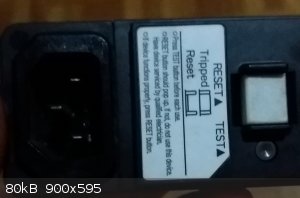 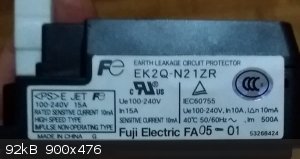
---------------------------------------------------------------------
feel free to correct my grammar, or any mistakes i make
---------------------------------------------------------------------
|
|
|
Ubya
International Hazard
    
Posts: 1247
Registered: 23-11-2017
Location: Rome-Italy
Member Is Offline
Mood: I'm a maddo scientisto!!!
|
|
outside connection box
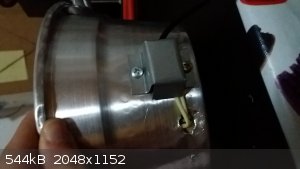
---------------------------------------------------------------------
feel free to correct my grammar, or any mistakes i make
---------------------------------------------------------------------
|
|
|
XeonTheMGPony
International Hazard
    
Posts: 1640
Registered: 5-1-2016
Member Is Offline
Mood: No Mood
|
|
get some fiber glass cloth and fill in the hole by wrapping it around the wires, as that is a fraying risk there!
|
|
|
Ubya
International Hazard
    
Posts: 1247
Registered: 23-11-2017
Location: Rome-Italy
Member Is Offline
Mood: I'm a maddo scientisto!!!
|
|
don't worry, the electrical connection is well insulated, the tiny metal box is there just to hold everything, this way if i pull the electrical wcord
i won't snap the fragile nichrome.
tomorrow i'll let it run at the lowest power i can to burn off all the fiberglass organic binder.
---------------------------------------------------------------------
feel free to correct my grammar, or any mistakes i make
---------------------------------------------------------------------
|
|
|
XeonTheMGPony
International Hazard
    
Posts: 1640
Registered: 5-1-2016
Member Is Offline
Mood: No Mood
|
|
I am talking mechanical protection, leaving the hole as it is in the picture is forbidden by all electrical codes!
It is a very ruff and jagged hole, far too much risk in its current state, you are tempting fate with that !
Other wise the rest looks good
|
|
|
Ubya
International Hazard
    
Posts: 1247
Registered: 23-11-2017
Location: Rome-Italy
Member Is Offline
Mood: I'm a maddo scientisto!!!
|
|
Quote: Originally posted by XeonTheMGPony  | I am talking mechanical protection, leaving the hole as it is in the picture is forbidden by all electrical codes!
It is a very ruff and jagged hole, far too much risk in its current state, you are tempting fate with that !
Other wise the rest looks good |
i'm going to fill that up.
that aluminium pot has walls as thin as you can get them. i made that hole with a screw driver and enlarged it with scissors, the aluminium is so thin
that it ripped instead of bending or getting scraped... how could someone ever use this to cook?
---------------------------------------------------------------------
feel free to correct my grammar, or any mistakes i make
---------------------------------------------------------------------
|
|
|
XeonTheMGPony
International Hazard
    
Posts: 1640
Registered: 5-1-2016
Member Is Offline
Mood: No Mood
|
|
Aluminium there is first mistake! (I hate aluminium cook ware utter garbage for the most part, Cast iron or Stainless!)
|
|
|
Aspigma
Harmless

Posts: 1
Registered: 2-1-2019
Member Is Offline
|
|
DIY Heating Mantle How To Build It
In my opinion you are not right. Write to me in PM, we will communicate.
|
|
|
XeonTheMGPony
International Hazard
    
Posts: 1640
Registered: 5-1-2016
Member Is Offline
Mood: No Mood
|
|
An assertion made with out evidence can be discarded with out evidence.
Demonstrate he is wrong here, or you are the one that is wrong.
|
|
|
Ubya
International Hazard
    
Posts: 1247
Registered: 23-11-2017
Location: Rome-Italy
Member Is Offline
Mood: I'm a maddo scientisto!!!
|
|
i'm all ears, write here so everybody can learn from my mistakes, non just me
---------------------------------------------------------------------
feel free to correct my grammar, or any mistakes i make
---------------------------------------------------------------------
|
|
|
andy1988
Hazard to Others
  
Posts: 135
Registered: 11-2-2018
Location: NW Americus ([i]in re[/i] Amerigo Vespucci)
Member Is Offline
Mood: No Mood
|
|
I'm pretty sure it's spam, a variant of the n-gram model generated spam I see here posted sometimes (gibberish spam without links, but has recognizable words/phrases from the context). Just
prune it.
I guess a vintage sock knitting machine could be used to make the heating sleeves from whatever fabric, but the costs don't look worth it unless you're making enough for a classroom or something.
[Edited on 2-2-2019 by andy1988]
|
|
|
morganbw
National Hazard
   
Posts: 561
Registered: 23-11-2014
Member Is Offline
Mood: No Mood
|
|
@Ubya
You are on the right track to get a fine heating mantle.
It can be done without any bells and whistles as well and work pretty good.
I have done a couple and they are more ghetto style. Safety not as good as you are doing but as an individual, I know the shortcuts I took, I
understand the dangers exposed, and as no one other than me will be using it, I am okay with what I have done.
Just not to be misunderstood, your way is better on all levels than my way.
I am just pointing out that it can be pretty shoddy and still work, providing care is taken.
|
|
|